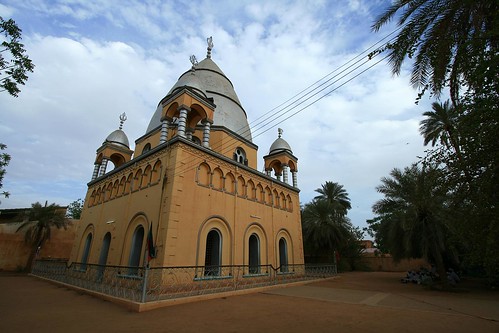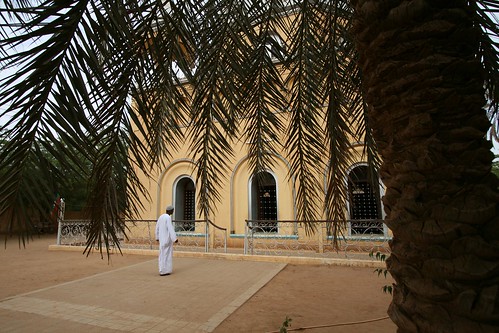Eight hours later, at 2am, I arrived in Khartoum, tired and disoriented from the full day of bus travel. I asked the first taxi driver I saw to take me to souq as-Shabi.
“OK! Ten Pounds!”
M’rees (my friend from the station in Gedaref) smacked him on the head and then told me that we’re already at as-Shabi. Realizing that in my current state I probably would’t do too well on my own, M’rees got into a taxi with me and tried to locate a hotel. He was starting to get frustrated - we could only find expensive ones - so he took me to his aunt’s place and offered me a spare bed for the night! I was in no position to turn him down, so I very gratefully accepted. M’rees woke me at 8am to serve me tea and biscuits. The tradition of hospitality among the Sudanese is something I’ve heard stories about from everyone I’ve met who’s traveled here, and already I’m experiencing it myself. M’rees’ brother drives a tuk-tuk, so he took us downtown for a 2nd try at finding a hotel.
We visited two places near as-Shabi but they told me that I’ll have to check in with the police before I can get a bed anywhere. So, to the police station… They seemed confused by this “checking in” business I was asking about and sent me across town to the US embassy. M’rees and I went there, only to be met with more confusion. The guard told me that all foreigners should stay at the Hilton. Right! He directed me to the Aliens Registration Office which is, thankfully, right around the corner from the embassy. However, being Friday, the office was closed until the next day.
“Welcome to Sudan!” the guard told me when I threw up my arms in exasperation. “Don’t worry! Come tomorrow.”
M’rees took me back to as-Shabi and after asking around at quite a few lokandas we managed to find one that gave me a bed for 7SD a night. It was far from luxurious - in fact one of the worst places I’ve ever slept - but I wanted to let M’rees go and the price was certainly right. I was given a mattress with a sheet and a pillow. “It is heat - you sleep roof, up up,” the man at the desk told me. I left my bag and met a few of my roofmates.


I bought M’rees lunch and thanked him profusely. It was a struggle to get him to allow me to pay. Just before he said goodbye, he sneakily bought some drinks and thrust them into my arms.
“Welcome to Sudan.”
After a shower and a nap I was feeling much better and so decided to make an outing across the Nile bridge to Omdurman and visit the Mahdi’s tomb. My Bradt guide describes a friday evening at the tomb as “one of the highlights of any visit to Sudan,” but I was pretty underwhelmed by the experience. Described in the book is a lively scene of Sufi whirling dervishes who congregate each week to honor the Mahdi, but I found no dervishes and everyone I asked knew nothing about them. It was still worth a visit - the time and adjoining mosque are nice - but not too exciting.


I sat by the road to drink some tea afterwards and met Liam, the only other khawaja I’d seen so far in Sudan. He has lived in Khartoum for 2 years working for an NGO called Practical Action.
Traveling in many third-world countries has left me with a generally low opinion of most foreign aid efforts. All too often I see the ill effects of organizations who throw money at the symptoms of problems without addressing the real causes. There is no shortage of volunteers who seem to genuinely care and are devoted to their efforts, but there seems to be a real lack of good long-sighted guidance among these organizations, especially the ones I’ve encountered in Africa. So it was with skeptical ears that I listened to Liam describe the projects sponsored by Practical Action.
For once, I was genuinely impressed and very happy to learn about an organization that seems to be actually helping those in need on a permanent basis. For example: One of their projects addressed the famine in Darfur. The goal was to help the farmers regain the use of their land, most of which had fallen into disuse because they couldn’t afford the oxen needed to plow their fields. The engineers of the NGO worked with the local blacksmiths to invent a plow which can be operated with a donkey, a much more affordable alternative. The local blacksmiths build and sell the plows completely from local materials, the farmers are able to raise more crops, and the organization can remove itself from the equation and move on to other issues. Check out their website: http://www.itdg.org/.
Liam and I chatted for a couple hours over sheesha. He shared some stories about his travels around the Middle East and recommended some places for me to visit. We may cross paths again in Jordan in a couple months, insha Allah!
I’m beginning to get acclimatized to traveling in Sudan, and so far it’s been a great experience. Its amazing how far off the image i used to have of the country was from the reality. Of course, war and extreme poverty continue to affect many people in some provinces, but for millions of others, life is relatively good by east African standards and getting better. Khartoum has developed into a modern city to rival Dar es Salaam or Addis Ababa, thanks to the riches of the southern oil fields.
The civil war in the south appears, at least for now, to be over. I’ve met several Sudanis on the way to visit their families in the south for the first time in 10, 15 and even 20 years. And unlike certain other developing countries that have a strong security apparatus, Sudan has fully embraced the internet. The speed of the connections I’ve used in Khartoum are the fastest I’ve seen in Africa. The Sudanis I’ve met are well-informed about current events and are generally well-educated. I feel completely safe walking the streets ar any hour, and I’m never lost for than a few minutes before someone comes to my aid, often insisting that they personally show me to my destination.
If only it wasn’t so damn hot!